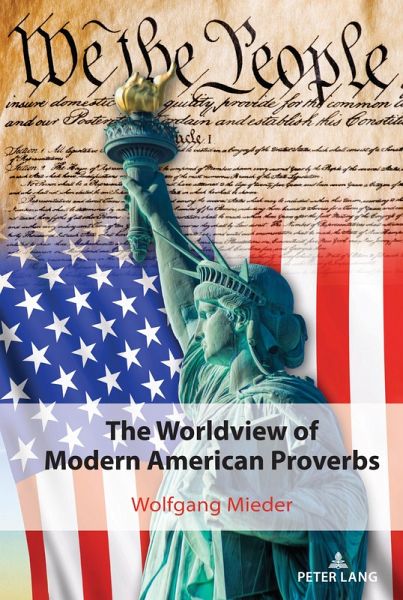
The Worldview of Modern American Proverbs (eBook, PDF)
Versandkostenfrei!
Sofort per Download lieferbar
Statt: 100,65 €**
77,95 €
inkl. MwSt.
**Preis der gedruckten Ausgabe (Gebundenes Buch)
Alle Infos zum eBook verschenkenWeitere Ausgaben:

PAYBACK Punkte
39 °P sammeln!
There was a time when the word "modern" would not have appeared in folklore scholarship in general and in proverb studies in particular. After all, folklorists and cultural historians were primarily interested in traditional materials with some consideration also being given to their innovative adaptations. While this interplay of tradition and innovation informed many studies that exemplified a certain constancy in change, little attention was paid to new or modern folklore items. But there has been a revolutionary change during the past few decades in that scholars have looked at the creatio...
There was a time when the word "modern" would not have appeared in folklore scholarship in general and in proverb studies in particular. After all, folklorists and cultural historians were primarily interested in traditional materials with some consideration also being given to their innovative adaptations. While this interplay of tradition and innovation informed many studies that exemplified a certain constancy in change, little attention was paid to new or modern folklore items. But there has been a revolutionary change during the past few decades in that scholars have looked at the creation of new folklore. This change of emphasis has also influenced paremiographers (proverb collectors) and paremiologists (proverb scholars). In fact, the Dictionary of Modern Proverbs (2012) edited by Charles Clay Doyle, Wolfgang Mieder, and Fred R. Shapiro has become solid proof that there is such a phenomenon as modern proverbs.
This is the first study of authentic modern American proverbs without including proverbs of British origin. The first of nine chapters discusses the origin, nature, and meaning of modern American proverbs based on about 1500 texts. The next large chapter contains a general overview of their forward-looking message that includes the American spirit of mobility with its emphasis toward a successful and exciting future. The third chapter treats proverbial emotions about modern life, with the fourth chapter considering the modern wisdom about age and aging. The next two chapters cover somatic aspects of these proverbs and also the preoccupation with time. This is followed by a discussion about pecuniary proverbs that reflect the attitudes of a capitalistic society. The next chapter shows that modern proverbs continue to include references to animals as has been the case with older proverbs. Finally, there is the ninth chapter about sexuality and scatology in modern proverbs, indicating that these topics play a considerable role in this modern wisdom. Such proverbs were often excluded form proverb collections. With the much greater openness about love, sex, and various taboos, proverbs have become much more open literally or figuratively about these matters that are an obsession of sorts throughout the society. Altogether these nine chapters with their many modern American proverbs present a fascinating metaphorical picture of a general of composite American worldview.
This is the first study of authentic modern American proverbs without including proverbs of British origin. The first of nine chapters discusses the origin, nature, and meaning of modern American proverbs based on about 1500 texts. The next large chapter contains a general overview of their forward-looking message that includes the American spirit of mobility with its emphasis toward a successful and exciting future. The third chapter treats proverbial emotions about modern life, with the fourth chapter considering the modern wisdom about age and aging. The next two chapters cover somatic aspects of these proverbs and also the preoccupation with time. This is followed by a discussion about pecuniary proverbs that reflect the attitudes of a capitalistic society. The next chapter shows that modern proverbs continue to include references to animals as has been the case with older proverbs. Finally, there is the ninth chapter about sexuality and scatology in modern proverbs, indicating that these topics play a considerable role in this modern wisdom. Such proverbs were often excluded form proverb collections. With the much greater openness about love, sex, and various taboos, proverbs have become much more open literally or figuratively about these matters that are an obsession of sorts throughout the society. Altogether these nine chapters with their many modern American proverbs present a fascinating metaphorical picture of a general of composite American worldview.
Dieser Download kann aus rechtlichen Gründen nur mit Rechnungsadresse in A, D ausgeliefert werden.













